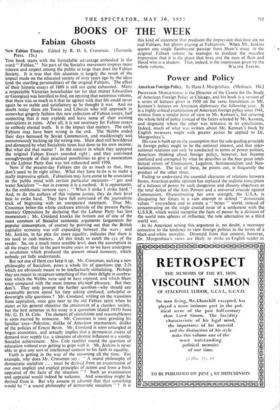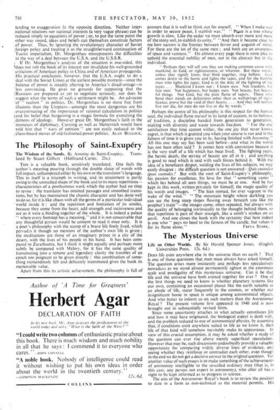Power and Policy
American Foreign Policy. By Hans J. Morgenthau. (Methuen. 18s.) PROFESSOR MORGENTHAU is the Director of the Centre for the Study of American Foreign Policy at Chicago, and his book is a version of a series of lectures given in 1950 on the same foundation as Mr. Kennan's lectures on American diplomacy the following year. It is a highly critical examination of American foreign policy since 1941, written from a similar point of view to Mr. Kennan's, but covering the whole field of policy instead of the facets selected by Mr. Kennan, and dogmatic where the other was tentative in its conclusions. Indeed, much of what was written about Mr. Kennan's book by English reviewers might with greater justice be applied to Dr. Morgenthau 's.
His case is built up on the assumption that the sole guiding principle in foreign policy ought to be the national interest, and that inter- national relations can only be conducted in terms of power politics. American thinking about foreign policy, however, has become confused and corrupted by what he describes as the four great intel- lectual errors of Utopianism, Legalism, Sentimentalism and Neo- Isolationism. The last of these, he points out, is frequently the product of the other three.
Failing to understand the essential character of relations between States, American public opinion has replaced the realistic conception of a balance of power by such dangerous and illusory objectives as the total defeat of the Axis Powers and a universal crusade against Communism. Overestimating her own strength, the U.S.A. is • dissipating her forces in a vain attempt to defend " democratic values " everywhere and to create a " better " world, instead of concentrating on the single crucial issue of a settlement with the U.S.S.R. which would recognise the facts of power by a division of the world into spheres of influence, the sole alternative to a third world war.
In -its American setting this argument is, no doubt, a necessary corrective to the tendency to view foreign politics in the terms of a black-and-white morality. Divorced from that context, however, Dr. Morgenthau's views are likely to strike an English reader as
tending to exaggeration in the opposite direction. Neither inter, 'national relations nor national interests (a very vague phrase) can be• reduced simply to equations of power ; or, to put the same point the other way round, ideas and beliefs can themselves constitute factors ,of power. Thus, by ignoring the revolutionary character of Soviet !foreign policy and treating it as the straightforward continuation of Tsarist imperialism, Dr. Morgenthau misrepresents the difficulties in the way of a deal between the U.S.A. and the U.S.S.R.
If Dr. Morgenthau's analysis of the situation is one-sided, this does not rob the book of its interest nor invalidate his well-grounded -criticisms of American policy in China and of American propaganda. ..His practical conclusion, however, that the U.S.A. ought to do a 'deal with the Soviet Union at the earliest possible moment—since the balance of power is steadily altering to America's disadvantage—is
convincing. He gives no grounds for supposing that the iRussians are prepared as yet to negotiate seriously, nor does he -:suggest what the terms of such a settlement might be. An advocate of " realism " in politics, Dr. Morgenthau is no more free from illusions than the Utopians—amongst the most dangerous are his ,overestimating of the importance of rational calculation in politics land his belief that bargaining is a magic formula for exorcising the ;demons of ideology. However great Dr. Morgenthau's faith in the resources of diplomacy, Canning as well as Metternich would have told him that " wars of opinion " are not easily reduced to the ,chess-board moves of old-fashioned power politics. ALAN BULLOCK.











































 Previous page
Previous page